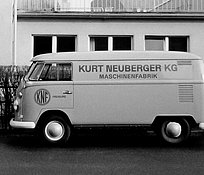
Pump Testing at KNF
For most applications, pump reliability is crucial. This is especially true for areas where stakes are high like the medical sector or nuclear power plants. KNF knows this and ensures maximum reliability with the help of measures like extensive pump testing. This way, customers receive clear and reliable information about the expected lifetime of their pump.
In most cases, KNF conducts tests with a defined number of pumps that run until a component fails. During the runtime, the pumps are checked at fixed intervals. For gas pumps, KNF uses ambient air and liquid pumps are tested with deionized water.
Individual Lifetime Testing Conditions
Depending on the pump type and the customers’ usage conditions, some pumps run continuously while others operate intermittently with on/off cycles. For maximum reliability, liquid pumps undergo tests with 10% more pressure than specified – e.g., a pump with a maximum pressure of 6 bar is tested at a pressure of 6.6 bar. Gas pumps are tested under worst-case conditions to stress the parts, which are of special interest to a maximum, if not specified otherwise by the customers.
Analyses at Fixed Intervals
Whenever a lifetime test pump reaches a certain runtime or fails, in-depth analyses are conducted. This includes different methods like visual inspections of all parts. During the ongoing lifetime testing, the pumps’ performance is examined by measuring specific points of the pump characteristics curve or by recording the pump characteristics curve itself.
In Depth Failure Analysis
When failure occurs and the pump curve has been measured, the affected pump is taken apart for an optical analysis of every part. An additional noise analysis can be conducted as well as a special bearing analysis. These measures give precise answers to why the pump has failed, grant a reliable estimate of the average lifetime and sometimes enable improvements. The pump test results may also lead to a supplier analysis. Oftentimes, the defective component is then replaced, and the lifetime testing continues allowing for further tests of the other pump components.
What Information Do Customers Receive?
As a result of the in-depth testing, KNF is able to provide reliable information about the expected pump lifetime to customers. For many pump series, customers can receive data in the form of Mean Time to Failure (MTTF), B10-Life and two-sided confidence bounds.
- MTTF states the average time by which pumps fail. Roughly 50% of the pumps are expected to fail at this time or later.
- B10-Life describes the time by which 10% of the pumps are expected to fail. In other words, 90% of the pumps are expected to achieve at least this lifetime.
- With a two-sided confidence bound of 95%, customer know in which time bounds 95% of the pumps are expected to fail. This means that 2.5% are expected to fail earlier than the lower bound and 2.5% later than the upper bound.
Outstanding Lifetime Testing Results
With countless tests over the years, sometimes phenomenal test results are achieved. During a test of eight gas pumps, a runtime of over 68,000 hours (over 7.7 years) has been achieved and the pumps continue to function today. With liquid pumps, one test series was stopped after it exceeded the desired runtime by far by running more than 70,000 hours (over 8 years) without failure. Considering that all pump tests simulate worst-case loads and conditions, it is safe to assume that the pumps would last even longer in the customers’ systems under normal operating conditions.
75 Years: KNF Celebrates Company Anniversary
A treasure chest filled with memories, facts and stories. Learn more about KNF’s company history.


